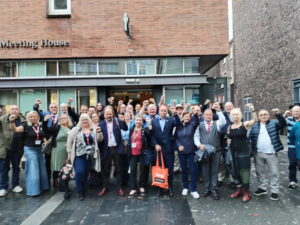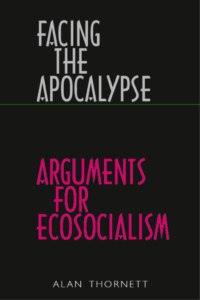Ecosocialist writer and Fourth International activist. Michael Löwy. presents ‘Nine Theses on Ecosocialist Degrowth’ in an issue of the US magazine Monthly Review dedicated to a discussion on this important topic. If you can afford it please buy this issue (details below).
I. The ecological crisis is already the most important social and political question of the twenty-first century, and will become even more so in the coming months and years. The future of the planet, and thus of humanity, will be decided in the coming decades. As the Intergovernmental Panel on Climate Change explains, if the average global temperature exceeds the pre-industrial period by 1.5°C, there is a risk of setting off an irreversible and catastrophic climate change process. What would be the consequences of this? Just a few examples: the multiplication of megafires destroying most of the forests; the disappearance of rivers and the exhaustion of subterranean water reserves; increasing drought and desertification of land; the melting and dislocation of polar ice and rise in sea level, leading to the flooding of the major cities of human civilization—Hong Kong, Kolkata, Venice, Amsterdam, Shanghai, London, New York, Rio de Janeiro. Some of these events are already taking place: drought is threatening millions of people in Africa and Asia with hunger; increasing summer temperatures have reached unbearable levels in some areas of the planet; forests are burning everywhere over increasingly extended fire seasons; one could multiply the examples. In some sense, the catastrophe has already begun—but it will become much worse in the next few decades, well before 2100. How high can the temperature go? At what temperature will human life on this planet be threatened? No one has an answer to these questions. These are dramatic risks without precedent in human history. One would have to go back to the Pliocene Epoch, millions of years ago, to find climate conditions similar to what could become reality in the future due to climate change.
II. What is responsible for this situation? It is human action, answer the scientists. The answer is correct, but a bit short: human beings have lived on Earth since hundreds of thousands of years ago, but the concentration of carbon dioxide in the atmosphere started to accumulate only after the Industrial Revolution and only began to become dangerous to life since 1945. As Marxists, our answer is that the culprit is the capitalist system. The absurd and irrational logic of infinite expansion and accumulation, productivism, and the obsession with the search for profit at any price are responsible for bringing humanity to the brink of the abyss.
The capitalist system’s responsibility for the imminent catastrophe is widely recognized. Pope Francis, in his Encyclical Laudato Si, without uttering the word “capitalism,” spoke out against a structurally perverse system of commercial and property relations based exclusively on the “principle of profit maximization” as responsible both for social injustice and destruction of our common home, nature. A slogan universally chanted the world over in ecological demonstrations is “System Change Not Climate Change!” The attitude shown by the main representatives of this system, advocates of business as usual—billionaires, bankers, so-called experts, oligarchs, and politicians—can be summed up by the phrase attributed to Louis XV: “After me, the deluge.” The complete failure of the dozens of United Nations COP Conferences on Climate Change to take the minimal measures necessary to stop the process illustrate the impossibility of a solution to the crisis within the limits of the prevailing system.
III. Can “green capitalism” be a solution? Capitalist enterprises and governments may be interested in the (profitable) development of “sustainable energies,” but the system has been dependent on fossil fuels (coal, oil, and gas) for the last three centuries, and shows no sign of willingness to give them up. Capitalism cannot exist without growth, expansion, accumulation of capital, commodities, and profits, and this growth cannot go on without an extended use of fossil fuels.
Green capitalist pseudo-solutions such as “carbon markets,” “compensation mechanisms,” and other manipulations of the so-called “sustainable market economy” have proven perfectly useless. While “greening” goes on and on, carbon dioxide emissions are skyrocketing and catastrophe gets closer and closer. There is no solution to the ecological crisis within the framework of capitalism, a system entirely devoted to productivism, consumerism, and the ferocious struggle for market share. Its intrinsically perverse logic inevitably leads to the breakdown of the ecological equilibrium and the destruction of the ecosystems. As Greta Thunberg put it, “it is mathematically impossible to solve the ecological crisis in the framework of the present economic system.”
The Soviet experience, whatever its merits or shortcomings, was also based on the logic of growth, grounded on the same fossil resources as the West. Much of the left during the last century shared the ideology of growth in the name of “developing the productive forces.” A productivist socialism that ignores the ecological crisis is unable to answer the challenges of the twenty-first century.
IV. The degrowth reflection and movement that emerged in the last few decades has made a great contribution to a radical ecology by opposing the myth of an unlimited “growth” on a limited planet. But degrowth in itself is not an alternative economic and social perspective: it does not define what kind of society will replace the present system. Some proponents of degrowth would ignore the issue of capitalism, focusing only on productivism and consumerism, defining the culprit as “The West,” “Enlightenment,” or “Prometheanism.” Others, which represent the left of the antigrowth movement, clearly designate the capitalist system as responsible for the crisis, and acknowledge the impossibility of a “capitalist degrowth.”
In the last few years, there has been a growing coming together of ecosocialism and degrowth: each side has been appropriating the arguments of the other, and the proposal of an “ecosocialist degrowth” has begun to be adopted as a common ground.
V. Ecosocialists have learned much from the degrowth movement. Ecosocialism is therefore increasingly adopting the need of degrowth in the process of transition to a new socialist ecological society. One obvious reason for this is that most renewable energies, such as wind and solar, (a) need raw materials that do not exist an on an unlimited scale and (b) are intermittent, depending on climate conditions (wind, sun). They cannot, therefore, entirely replace fossil energy. A substantial reduction of energy consumption is therefore inevitable. But the issue has a more general character: the production of most goods is based on the extraction of raw materials, many of which (a) are becomingly increasingly limited and/or (b) create serious ecological problems in the process of extraction. All these elements point to the need for degrowth.
Ecosocialist degrowth includes the need for substantial reductions in production and consumption, but does not limit itself to this negative dimension. It includes the positive program of a socialist society, based on democratic planning, self-management, production of use values instead of commodities, gratuity of basic services, and free time for the development of human desires and capacities—a society without exploitation, class domination, patriarchy, and all forms of social exclusion.
VI. Ecosocialist degrowth does not have a purely quantitative conception of degrowth as a reduction in production and consumption. It proposes qualitative distinctions. Some productions—for example, fossil energies, pesticides, nuclear submarines, and advertising—should not be merely reduced, but suppressed. Others, such as private cars, meat, and airplanes, should be substantially reduced. Still others, such as organic food, public means of transport, and carbon neutral housing, should be developed. The issue is not “excessive consumption” in the abstract, but the prevalent mode of consumption, based as it is on conspicuous acquisition, massive waste, mercantile alienation, obsessive accumulation of goods, and the compulsive purchase of pseudo-novelties imposed by “fashion.” One must put an end to the monstrous waste of resources by capitalism based on the production, on a large scale, of useless and harmful products: the armaments industry is a good example, but a great part of the “goods” produced in capitalism, with their inbuilt obsolescence, have no other usefulness but to generate profit for large corporations. A new society would orient production toward the satisfaction of authentic needs, beginning with those which could be described as “biblical”—water, food, clothing, and housing—but including also the basic services: health care, education, transport, and culture.
How to distinguish the authentic from artificial, factitious, and makeshift needs? The last ones are induced by mental manipulation, that is, advertisement. While advertisement is an indispensable dimension of the capitalist market economy, it would have no place in a society transitioning to ecosocialism, where it would be replaced by information on goods and services provided by consumer associations. The criterion for distinguishing an authentic from an artificial need is its persistence after the suppression of advertisements (Coca-Cola!). Of course, old habits of consumption would persist for some time, and nobody has the right to tell the people what their needs are. The change in patterns of consumption is a historical process, as well as an educational challenge.
VII. The main effort in a process of planetary degrowth must be made by the countries of the industrialized North (North America, Europe, and Japan) responsible for the historical accumulation of carbon dioxide since the Industrial Revolution. They are also the areas of the world where the level of consumption, particularly among the privileged classes, is clearly unsustainable and wasteful. The “underdeveloped” countries of the Global South (Asia, Africa, and Latin America) where basic needs are very far from being satisfied will need a process of “development,” including building railroads, water and sewage systems, public transport, and other infrastructures. But there is no reason why this cannot be accomplished through a productive system that is environmentally friendly and based on renewable energies. These countries will need to grow great amounts of food to nourish their hungry populations, but this can be much better achieved—as the peasant movements organized worldwide in the Vía Campesina network have been arguing for years—by a peasant biological agriculture based on family units, cooperatives, or collectivist farms. This would replace the destructive and antisocial methods of industrialized agribusiness, based on the intensive use of pesticides, chemicals, and genetically modified organisms. Presently, the capitalist economy of countries in the Global South is rooted in the production of goods for their privileged classes—cars, airplanes, and luxury goods—and commodities exported to the world market: soya beans, meat, and oil. A process of ecological transition in the South, as argued by ecosocialists, would reduce or suppress this kind of production, and aim instead at food sovereignty and the development of basic services such as health care and education, which need, above all, human labor, rather than more commodities.
VIII. Who could be the subject in the struggle for an ecosocialist degrowth? The workerist/industrialist dogmatism of the previous century is no longer current. The forces now at the forefront of the social-ecological confrontations are youth, women, Indigenous people, and peasants. The resistance of Indigenous communities in Canada, the United States, Latin America, Nigeria, and elsewhere to the capitalist oil fields, pipelines, and gold mines is well documented; it flows from their direct experience of the destructive dynamics of capitalist “progress,” as well as the contradiction between their spirituality and culture and the “spirit of capitalism.”
Women are very present in the Indigenous resistance movement as well as in the formidable youth uprising launched by Thunberg’s call to action—one of the great sources of hope for the future. As the ecofeminists explain, this massive women’s participation in mobilizations comes from the fact that they are the first victims of the system’s damage to the environment.
Unions are beginning here and there to also get involved. This is important, because, in the final analysis, we cannot overcome the system without the active participation of urban and rural workers who make up the majority of the population. The first condition, in each movement, is associating ecological goals (closing coal mines, oil wells, coal-fired power stations, and so on) with guaranteed employment for the workers involved. Ecologically minded unionists have argued that there are millions of “green jobs” that would be created in a process of ecological transition.
IX. Ecosocialist degrowth is at once a project for the future and a strategy for the struggle here and now. There is no question of waiting for the conditions to be “ripe.” It is necessary to provoke a convergence between social and ecological struggles and to fight the most destructive initiatives by powers at the service of capitalist “growth.” Proposals such as the Green New Deal are part of this struggle in their more radical forms, which require effectively renouncing fossil energies—but not in those reforms limited to recycling the system.
Without any illusions on a “clean capitalism,” one must try to buy time, and to impose on the powers that be some elementary measures of degrowth, beginning with a drastic reduction in greenhouse gas emissions. The efforts to stop the Keystone XL Pipeline, a polluting gold mine, and a coal-fired facility are part of the larger resistance movement, called Blockadia by Naomi Klein. Equally significant are local experiences of organic agriculture, cooperative solar energy, and community management of resources.
Such struggles around concrete issues of degrowth are important, not only because partial victories are welcome in themselves, but also because they contribute to raising ecological and socialist consciousness while promoting activity and self-organization from below. These factors are decisive and necessary preconditions for a radical transformation of the world—that is, for a Great Transition to a new society and a new mode of life.
Michael Löwy is emeritus research director at the French National Centre for Scientific Research in Paris. He is the co-author, with Bengi Akbulut, Sabrina Fernandes, and Giorgos Kallis, of the call “For an Ecosocialist Degrowth” in the April 2022 issue of Monthly Review, and author of Ecosocialism: A Radical Alternative to Capitalist Catastrophe (Haymarket Books, 2015).
Republished from Monthly Review: https://monthlyreview.org/2023/07/01/nine-theses-on-ecosocialist-degrowth/
Full contents described here: https://monthlyreview.org/2023/07/01/mr-075-03-2023-07_0/ Purchase here: https://monthlyreview.org/product/mr-075-03-2023-07/




 William Morris – the outstanding environmentalist in the 19th century – had also gone unheeded when he raged against useless and unnecessary production. In his lecture ‘How We Live and How We Might Live’, delivered in December 1884 in Hammersmith [Image above]– he raised the issue of how to live dignified and fulfilling lives without the need for mass produced commodities and consumerism, and what kind of future society could best provide such an approach.
William Morris – the outstanding environmentalist in the 19th century – had also gone unheeded when he raged against useless and unnecessary production. In his lecture ‘How We Live and How We Might Live’, delivered in December 1884 in Hammersmith [Image above]– he raised the issue of how to live dignified and fulfilling lives without the need for mass produced commodities and consumerism, and what kind of future society could best provide such an approach.
 As a global society, we must pursue policies to reduce material consumption and increase our wellbeing. This is the core of degrowth.It is exceptionalism that leads us to think that our
As a global society, we must pursue policies to reduce material consumption and increase our wellbeing. This is the core of degrowth.It is exceptionalism that leads us to think that our 